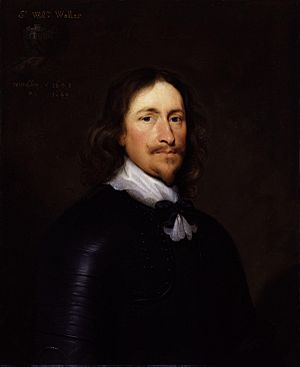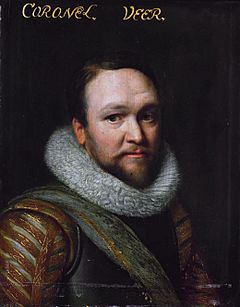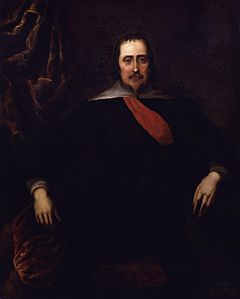William Waller facts for kids
Quick facts for kids
General Sir
William Waller
|
|
|---|---|

Portrait by Cornelius Johnson, c. 1643
|
|
| Member of Parliament for Middlesex |
|
| In office 1660–1660 |
|
| Member of Parliament for Andover |
|
| In office 1640 – 1648 (suspended) |
|
| Personal details | |
| Born | 1598 Knole House, Kent, England |
| Died | 19 September 1668 (aged 69–70) Osterley Park, London, England |
| Resting place | Westminster Chapel |
| Spouses | (1) Jane Reynell (1622–1633) (2) Anne Finch (1638–1652) (3) Anne Harcourt (1652–1661) |
| Relations | Edmund Waller (1606–1687) Sir Hardress Waller (1604–1666) |
| Children | (1) Margaret (1633–1694); (2) William (1639–1699) |
| Parents | Sir Thomas and Lady Margaret Waller |
| Education | Magdalen Hall, Oxford |
| Occupation | Soldier and politician |
| Military service | |
| Years of service | 1617 to 1621, 1642 to 1645 |
| Rank | Major General |
| Battles/wars | |
Sir William Waller (born around 1598, died September 19, 1668) was an English soldier and politician. He was a key leader for the Parliamentary side during the First English Civil War.
Waller was elected as a Member of Parliament for Andover in 1640. He gave up his military roles in 1645 due to a rule called the Self-denying Ordinance. He was a very religious man and a Puritan, but he was also a moderate who didn't want the army to get involved in politics after 1646.
Because of his views, he was removed from Parliament twice. Once in 1647 and again in 1648, because he refused to support the trial and execution of King Charles I. He was arrested several times during the period when England had no king (the British Interregnum).
In 1660, when the king was brought back (the Stuart Restoration), Waller was elected to Parliament again. He then retired from politics and passed away in September 1668. Waller was one of many who fought in the Wars of the Three Kingdoms even though they didn't want to. They fought because of their strong religious or political beliefs.
He is often remembered for a letter he wrote in 1643 to his friend and opponent, Sir Ralph Hopton. Hopton fought for the King, while Waller fought for Parliament.
That great God who is the searcher of my heart knows with what a sad sense I go upon this service, and with what a perfect hatred I detest this war without an enemy;... We are both upon the stage and must act such parts as are assigned us in this tragedy, let us do it in a way of honour, and without personal animosities.
This quote shows how sad Waller was about the war. He saw it as a tragedy where friends had to fight each other.
Contents
Who Was William Waller?
William Waller was born at Knole, a place near Sevenoaks in Kent, England. His parents were Sir Thomas Waller and Margaret Lennard. He went to Magdalen Hall, Oxford, which was known for its Puritan teachings. However, he did not finish his degree there.
Both his father and grandfather had served in Parliament. His cousin was Sir Hardress Waller, who was also an important figure.
Waller's Family Life
William Waller was married three times:
- Jane Reynell (from 1622 to 1633)
- Lady Anne Finch (from 1638 to 1652)
- Lady Anne Harcourt (from 1652 to 1661)
He had six children in total, but only two lived to be adults. These were his daughter Margaret (1633–1694) and his son William (1639–1699).
Waller's Early Military Career

The Waller family had held important positions for a long time, but they lost much of their wealth in the late 1500s. William's father, Thomas, served in Ireland and bought back the family lands at Groombridge in 1601.
William followed his father and became a professional soldier. In 1617, he joined the army of the Venetian Republic. There, he met another English soldier, Sir Horace Vere. In 1620, Waller and Sir Ralph Hopton were part of the personal guard for Elizabeth, Queen of Bohemia. She was the sister of the future King Charles I.
After Elizabeth's husband was defeated in battle, Waller and Hopton helped her escape to safety. When Waller returned to England in 1622, he was made a knight. He also inherited rights to collect money from wine imports, which made him quite wealthy.
This wealth allowed him to marry Jane Reynell. After she passed away, he inherited her estates. Waller was a strong Presbyterian, a type of Protestant Christian. He became connected with other people who shared his beliefs and later supported Parliament. These included important figures like John Pym and Lord Saye.
His second wife, Lady Anne Finch, also shared his religious views. In 1638, they bought Winchester Castle. They lived a quiet life in the countryside. However, as the arguments between King Charles and Parliament grew, Waller felt he had to get involved. In April 1640, he was elected to Parliament for Andover. He was re-elected in 1642.
The English Civil War
When the First English Civil War started in August 1642, Waller strongly supported Parliament. He was made a colonel and quickly captured important places in southern England. These included Portsmouth, Farnham, and Winchester.
Waller's Early Battles (1643)
In early 1643, Waller was promoted to Major-general. He was put in charge of the Western Association army. His main opponent was his old friend, Sir Ralph Hopton, who led the King's forces, known as Royalists.
After a battle at Lansdowne in July, Hopton's army joined with Prince Maurice. On July 13, their combined forces defeated Waller's army badly at Roundway Down. Waller and about 500 cavalry managed to escape to Bristol.
However, Bristol was soon taken by Prince Rupert. This left Parliament's forces in the west stuck in a few isolated places like Plymouth.
Rebuilding the Army
Even though he lost at Roundway Down, Waller's reputation as a soldier remained strong. People on both sides were getting tired of the war. There were even protests in London. The Royalists decided to capture Gloucester, Parliament's last major position in the west. Then they planned to move on London.
Waller gathered a new army at Farnham Castle. This army was made up of local soldiers, called Trained Bands, from Kent, Sussex, and Hampshire. Soldiers from London also joined. These London units were often the best equipped and helped Parliament fill gaps in its army.
Waller's army helped stop Prince Rupert's advance on London at the First Battle of Newbury in September. An attack on Basing House in November failed. Many of Waller's soldiers wanted to go home after that.
Victories in the South-East (1643-1644)

Waller was ordered to retake Alton and then Arundel. He convinced the London soldiers to help him capture Alton on December 13. They refused to help with Arundel and went home.
However, Waller successfully captured Arundel on January 6, 1644. Heavy snow then stopped fighting for several weeks. By the end of February, Waller's army had grown to 5,000 foot soldiers and 3,500 cavalry. He was ordered to move past Hopton and retake the west.
Even though one of his officers, Sir Richard Grenville, switched sides and told Hopton Waller's plans, Waller still defeated Hopton at the Battle of Cheriton on March 29, 1644. This victory ended the Royalist threat in the south-east of England.
Challenges and Changes (1644-1645)
Waller then joined with Essex to attack Oxford. To avoid being trapped, King Charles and his main army retreated. Essex ordered Waller to follow the King, while Essex went to help at the siege of Lyme Regis.
On June 29, Waller fought King Charles at Cropredy Bridge. Waller's army didn't lose many men, but they were very tired and discouraged. His army then fell apart, causing panic in London. This allowed King Charles to chase Essex into the West Country.
Essex was defeated at Lostwithiel in September. At the Second Battle of Newbury on October 27, the Royalists were able to break the siege of Donnington Castle. Because Parliament's leaders, including Waller, Essex, and Manchester, didn't work together well, King Charles was able to return to Oxford.
Parliament was divided. Some wanted to negotiate a peace deal right away. Others believed that only a complete military victory would achieve their goals. There were also arguments about the alliance with Scotland and the idea of a unified, Presbyterian church. Oliver Cromwell even said he would fight against such terms.
These disagreements became public as people blamed each other for recent failures. In December, a rule called the Self-denying Ordinance was introduced. This rule said that any officers in the army or navy who were also Members of Parliament had to choose one role or the other. This meant that leaders like Manchester and Essex had to resign their military commands. Waller supported this rule and resigned his military position in April 1645.
Waller's Later Life
Waller was considered for a command in Ireland and even thought about returning to serve Venice. However, his active military career ended. He supported the creation of the New Model Army, which was Parliament's main army. But like other Presbyterians, he later saw it as a threat. He supported efforts to break up the army when the war ended in 1646.
In June 1647, Waller was one of several Members of Parliament accused by Cromwell of "plotting to destabilize the kingdom." He fled abroad in August. He stayed in The Hague and met with Elizabeth of Bohemia again. He returned home in June 1648.
He was arrested in 1650, supposedly for planning to bring back Charles II as king. He was released in early 1652. In 1654, he bought Osterley Park. Even though he was often questioned during the time without a king, he avoided getting involved in a rebellion in 1655.
At the Restoration in 1660, when the monarchy was brought back, he was elected to Parliament for Middlesex. However, he soon retired from political life. He spent some of his time writing a book called A Vindication of the Character and Conduct of Sir William Waller, which was published much later in 1793.
Sir William Waller passed away on September 19, 1668. He was buried in Westminster Abbey.]

